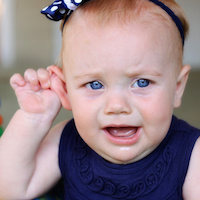 Kiwi parents need to be more vigilant in monitoring their children for ear infections if we want to prevent hearing loss and reduce the numbers admitted to hospital annually, according to a leading Starship surgeon.
Kiwi parents need to be more vigilant in monitoring their children for ear infections if we want to prevent hearing loss and reduce the numbers admitted to hospital annually, according to a leading Starship surgeon.
It is easy as a parent to become slightly blasé about ear infections, as they can occur frequently in small children.
Each year more than 5,000 Kiwi children are hospitalised with serious ear infections which if not treated, could lead to permanent hearing loss.
Starship otolaryngologist Dr Colin Barber says it is critical that ear infections are addressed as early as possible to prevent long term developmental impacts in Kiwi children.
“Eight out of ten children will suffer from ear infections by the age of three. Ear infections account for 83,000 GP consultations annually in New Zealand, and along with the time two thirds of parents must take off work to tend sick children, carries a significant economic cost to the country,” says Dr Barber.
“Research shows that hearing loss is associated with a range of educational issues and has also found that there is a higher incidence of hearing loss in the New Zealand male prison population which indicates a potential link between the condition and anti-social behaviour,” he says.
Dr Helen Petousis-Harris – Senior Lecturer, Dept General Practice and Primary Health Care of the University of Auckland – says some middle ear infections are preventable.
Dr Petousis-Harris says statistics show that Maori and Pacific Island children from high deprivation environments are particularly vulnerable and that they have benefited most from vaccination.
This is important given that one in ten Maori and Pacific Island children will fail hearing checks when they start school – a number that is twice as high as NZ European children.
She says these children have the highest levels of hospitalisation from ear infections and have the most to gain from national immunisation programmes. However since the introduction of the vaccine, the rates in Maori and Pacific children have fallen more than any other group.
For more information regarding childhood immunisations, contact your GP or Plunket nurse.









Join the Discussion
Type out your comment here:
You must be logged in to post a comment.